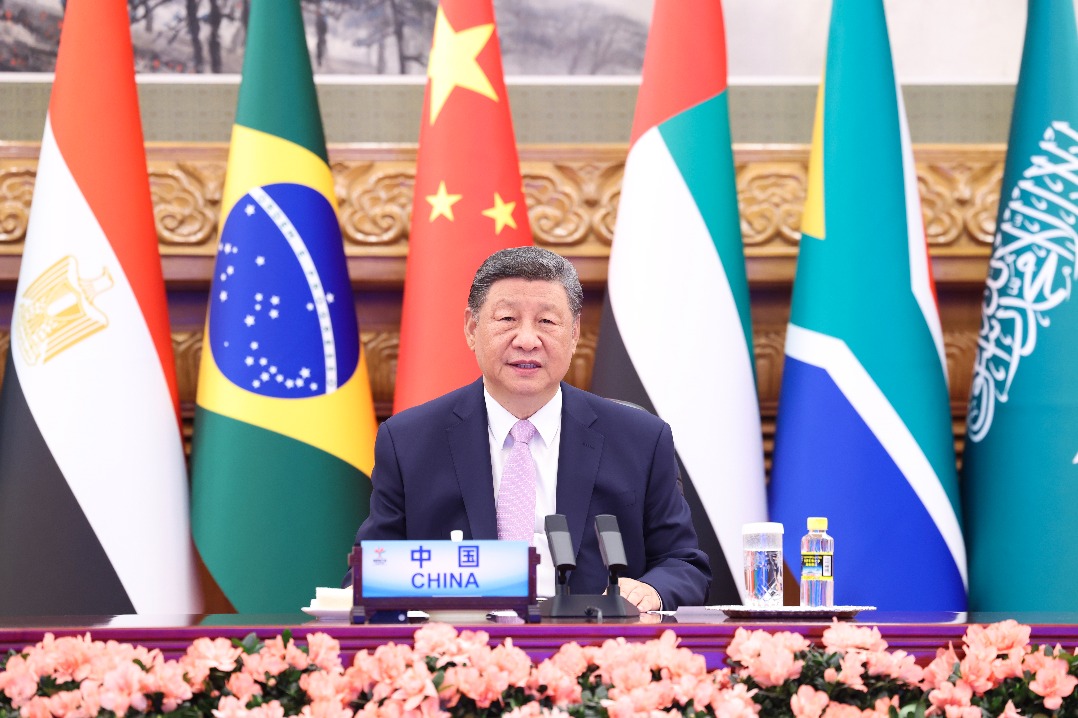Small stage, big show
Four decades have passed since audiences saw a close-up style of theater production, Chen Nan reports.

In August 1982, Chinese play Absolute Signal premiered in a small rehearsal room of the Beijing People's Art Theatre. The stage set was simple, with just a few boxes and steel frames, and the room was packed with audience members who were captivated by a pioneering artistic style they had not seen before.
The play centers on five characters: a train driver and his young trainee, a robber and two passengers — an unemployed young man and a young female beekeeper. They meet on the train where unexpected events unfold.
Directed by Lin Zhaohua, Absolute Signal marked a breakthrough for the established theater which is considered the flagship of Chinese drama. The play is widely considered to be the mainland's first small-theater production.
"It was a humid summer. We went on lots of train journeys, especially at night. It was quiet inside and outside the carriage, making the rumbling of the engine particularly clear. We talked, smoked cigarettes and drank tea together. We had great moments that were full of creative thinking," recalled Lin, 86, in an earlier interview on his experience of making the play along with his team.
After Absolute Signal, the Beijing People's Art Theatre staged numerous productions, launching its own small theater in 1995 near Capital Theater, its home. The play has influenced Chinese directors, scriptwriters and performers who have been pushing boundaries and experimenting with ideas by creating their own small-theater productions — original ones and those adapted from Western classics.
This year marks the 40th anniversary of Chinese mainland's small-theater sector. A number of events, such as photo exhibitions, workshops and forums, are being held to celebrate it.
A theater festival, Story in Beijing, which is dedicated to small-theater productions, also celebrates its 10th anniversary this year. Twenty Chinese small-theater plays will be staged with 40 shows in Beijing in November and December.
Highlights include When We Two Parted, which depicts the friendship between two women physicists and is directed by Zhu Hongxuan; one-man play Listen to Your Inner Ape, based on Franz Kafka's 1917 short story A Report to an Academy; and Rossum's Universal Robots, directed by Yang Ting and based on Czech writer and playwright Karel Capek's work in 1920 with the same title.
"The relationship between the audience and performers onstage differs widely between traditional, bigger theaters and smaller venues. In smaller theaters, with less distance between the performers and the audience, there is intense emotion and instant feedback from the audience," says Tao Qingmei, a researcher at the Institute of Literature, Chinese Academy of Social Sciences, who has been doing research on plays for small theaters for decades.
She recalls that she was first introduced to the concept of small-theater production when she watched the avant-garde drama director Meng Jinghui's iconic play titled Si Fan at a small theater at the Central Academy of Drama in Beijing in the early 1990s.
"Everything about small-theater plays was so fresh and unique back then, like the creativity and raw energy. Audiences were excited to watch those plays, which offered a totally different experience from big-budget shows at large theaters," Tao recalls.
Pioneering Chinese theater directors and companies, she adds, who turned their attention to small theaters, played an important role in contributing to its development in China.
She says the rising market of small-theater productions has also attracted people who work hard on popularizing traditional Chinese art forms. It is a platform to experiment with new technology, explore the psychological portrayal of characters and enhance young people's appreciation of Chinese cultural genres.
Director Bai Ailian's latest work, A Life of Mine, created with the Beijing Quju Opera Troupe, will be staged during the theater festival. The play premiered on Oct 22 and is adapted from the novella of the same title by Lao She (1899-1966), known for his vivid and humorous portrayal of ordinary people, especially the urban poor. A Life of Mine follows the tragic story of a low-ranked police officer.
This is the first time that Quju Opera is turned into a production for small theaters, Bai says.
Believed to be the only local opera form in Beijing, Quju was named by Lao She in 1952. That year, the writer wrote the script The Willow Well for Quju Opera.
"Compared to other traditional Chinese art forms, such as the 600-year-old Kunqu Opera and 200-year-old Peking Opera, Quju is relatively young, which allowed us to give the play a contemporary twist with bold ideas," says Bai, who started working on the play last year. Besides veteran Quju Opera performers, new graduates joined the play.
In the play, Bai used a narrative approach, which is often employed in contemporary plays, to tell the story of the main character. She also used paper-made life-size figures, to symbolize people with low social status, just like the protagonist.
"The actors, especially those who have been performing Quju Opera for years, were excited during the rehearsals. We spent three days talking about the script, and they inspired me with their creative ideas," says Bai.
She works with the Jingju Theatre Company of Beijing. Peking Opera, also known as jingju, brings together singing, dancing, martial arts and acrobatics.
The company has produced Ma Qian Po Shui, a Peking Opera show directed by theater veteran Zhang Manjun, which premiered in 2000 and is regarded as the first Peking Opera show made for small theaters.
Bai graduated from the Central Academy of Drama with a PhD in directing in 2003, and directed her first Peking Opera show, Six Records of a Floating Life, for small theaters in 2008.
When asked about her early experience of watching plays at small theaters, Bai says she is still inspired by the plays she watched in the 1990s, which opened her eyes to theater and inspired her to create her own works.
"There are many possibilities for directors, scriptwriters, actors and actresses working in small theaters. The styles can diversify, and the target audience is different," says Bai.


Today's Top News
- Huangyan approved as nature reserve
- Establishment of Huangyan Island nature reserve safeguards its marine environment
- Defense minister: Containment efforts unworkable
- Huangyan Island National Nature Reserve gets official go-ahead
- Defense leaders from over 100 countries to attend Xiangshan Forum
- China honors model teachers in celebration of Teachers' Day






























